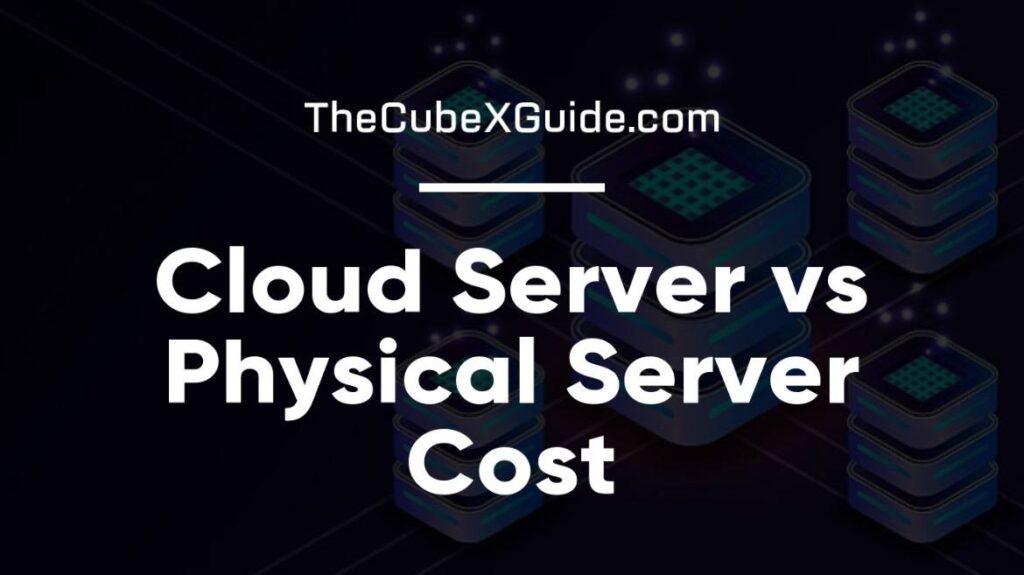The decision of whether to employ a cloud server or a physical server becomes more important as more firms transition to digitalization. Cost should be taken into account, even when both solutions offer advantages and disadvantages. We’ll compare the prices of a physical server and a cloud server in this post to help you decide which is more cost-effective for your company.
What is a Cloud Server?
A virtual server that utilises a cloud computing platform is referred to as a cloud server. This implies that you access the server remotely over the internet rather than having a physical server in your office. The cost of renting a cloud server is typically determined by utilisation and the quantity of resources needed.
What is a Physical Server?
On the other hand, a physical server is a tangible piece of hardware that is placed on-site. Your IT staff normally manages and maintains it, and it is typically located in a special server room or data centre. In the case of a physical server, you have total control over the hardware and software setups and can modify the server to suit your unique requirements.
Cloud Server vs Physical Server Cost Comparison
Let’s now contrast the prices of a cloud server and a physical server. There are many things to think about, including initial costs, ongoing costs, and maintenance costs.
Upfront Costs
The minimal upfront expenses of cloud servers are one of their main benefits. You don’t need to spend money on hardware or infrastructure while using a cloud server because everything is provided by the cloud provider. You merely choose your configuration, sign up for a service, and begin using the server.
Physical servers, on the other hand, demand a substantial upfront expenditure. Along with any additional infrastructure, such racks, connections, and cooling systems, you must buy the server hardware. The price tag on this is easily in the tens of thousands.
Ongoing Expenses
Cloud servers are often more expensive than physical servers in terms of recurring costs. This is due to the fact that cloud service providers charge you for each hour or minute the server is running as well as for any extra resources you utilise. (such as storage, bandwidth, and processing power).
In contrast, you only need to pay for the electricity and internet connection needed to maintain a physical server. Once you’ve paid for the hardware, utilising the server is free forever.
Maintenance Costs
When contrasting cloud servers versus physical servers, maintenance costs are a crucial factor. You are in charge of keeping up with and fixing the hardware and software on a physical server, which may be time-consuming and costly. To manage any issues that may develop, you must have an IT personnel on hand, and you must budget for upgrades and replacement components.
The monthly subscription for a cloud server often covers maintenance expenses. The hardware and software are maintained by the cloud provider, so you don’t have to worry about repairing or upgrading parts. In the long run, this could result in a sizable cost reduction.
Which is More Affordable: Cloud Server or Physical Server?
Which choice, a physical server or a cloud server, is more cost-effective? The answer depends on your unique needs and financial situation.
A cloud server might be the more cost-effective choice if you run a small business with limited resources and don’t want to make a significant initial investment. A cloud server can assist you in launching swiftly and affordably because it has low upfront expenses and doesn’t require hiring IT personnel.
On the other hand, a physical server can be the more cost-effective choice if you run a bigger company with a requirement for high speed computing and want total control over your server configuration. Although the initial expenditures could be greater, the continuing costs are frequently lower, and you normally have full control over your server architecture, which can be a big benefit.
It’s also important to keep in mind that a hybrid strategy might be the most economical choice for some companies. Depending on the particular requirements of each application or workload, this includes combining cloud servers with traditional servers. For instance, you might decide to employ a physical server for applications with consistent workloads that need great performance and low latency, and a cloud server for applications with unpredictable workloads that need scalability.
Factors to Consider When Choosing Between Cloud Servers and Physical Servers
In addition to price, there are other aspects to take into account while deciding between cloud servers and physical servers. These consist of:
- Scalability: Cloud servers are very scalable, allowing for rapid and simple resource addition or removal as required. In this aspect, physical servers are less adaptable and may need more hardware to suit shifting workloads.
- Security: Since cloud servers may be accessed online and data is stored on other servers, they may be thought of as being less secure than physical servers. However, cloud service providers make significant investments in security measures, and many companies discover that using cloud servers offers a higher level of security than using physical servers.
- Complete control over your server architecture is provided by physical servers, which can be advantageous for companies with particular needs. On the other hand, cloud servers are controlled by the cloud provider, thus you have less control over the hardware and software setups.
- Reliability: Compared to physical servers, cloud servers are less likely to incur downtime or data loss since they are built for high availability and redundancy. Cloud servers are still susceptible to outages and other problems, so picking a dependable provider with a solid track record of uptime and reliability is crucial.
Conclusion
In conclusion, there are a number of variables that affect how much a cloud server will cost compared to a physical server, including up-front costs, ongoing expenditures, and maintenance costs. While cloud servers provide easy scalability and minimal initial costs, they can cost more in the long term owing to continuing expenses. While physical servers are more expensive initially, they may end up being more affordable in the long run, particularly for companies with consistent workloads and particular infrastructure needs.
The decision between a cloud server and a physical server will ultimately be based on your unique requirements and financial constraints, as well as other aspects like scalability, security, control, and stability. You may make an informed selection and select the server option that is ideal for your company by carefully weighing these aspects.







